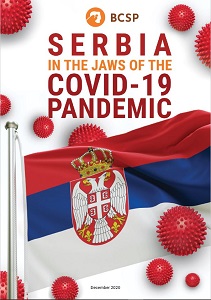SERBIA IN THE JAWS OF THE COVID-19 PANDEMIC
SERBIA IN THE JAWS OF THE COVID-19 PANDEMIC
Author(s): Author Non Specified
Subject(s): Social Sciences, Sociology, Health and medicine and law
Published by: BCBP Beogradski centar za bezbednosnu politiku
Summary/Abstract: The public opinion poll conducted by the Belgrade Centre for Security Policy (BCSP) in October 2020 shows that the society is divided, both when it comes to measures taken in relation to the COVID-19 pandemic and regarding the reaction of the competent institutions to the health crisis. Although no less than a third of the Serbian citizens do not believe in or have serious doubts about the existence of the COVID-19 pandemic,1the vast majority of them are of the opinion that the health crisis will have serious economic consequences, while a third are convinced that it has affected the level of democracy in Serbia. Most people see the pandemic as a threat to human and national security, but they are divided over how this crisis has affected their everyday lives. Polarisation was identified in relation to the level of trust in state institutions. Citizens trust the health care system the most, which is not surprising since the health care system commonly occupies a very high position in general surveys conducted to measure trust in all institutions. The reason for the high level of trust in the health system is the fact that it is the entire health system – not just the specialised COVID departments – that is bearing the brunt of the pandemic. As for other institutions, the percentage of trust in the President of the Republic and the Crisis Task Force for the Protection of the Population from the Infectious Disease COVID-19 stands at almost fifty-fifty, which again reflects the broader picture of citizens’ (dis)trust in these permanent and temporary institutions. One of the reasons for the division in the perception of disease as a threat to the personal safety of citizens is poor informing and reporting on the course and consequences of the pandemic (frequent contradictory messages provided by the Crisis Task Force and the authorities), which has been identified in the survey as one of the biggest problems of pandemic management. An enormous number of citizens perceive China as the largest financial and humanitarian donor during the period of the pandemic, which also influences - in the general survey - positive opinions about foreign countries, where China ranks first. Despite the fact that it was in fact the European Union that helped Serbia the most in the fight against the Coronavirus, in both financial and humanitarian terms, in the eyes of the citizens China still convincingly holds the first place.
Series: Beogradski Centar za Bezbednosnu Politiku - POLICY PAPERS
- Page Count: 10
- Publication Year: 2020
- Language: English
- Content File-PDF

